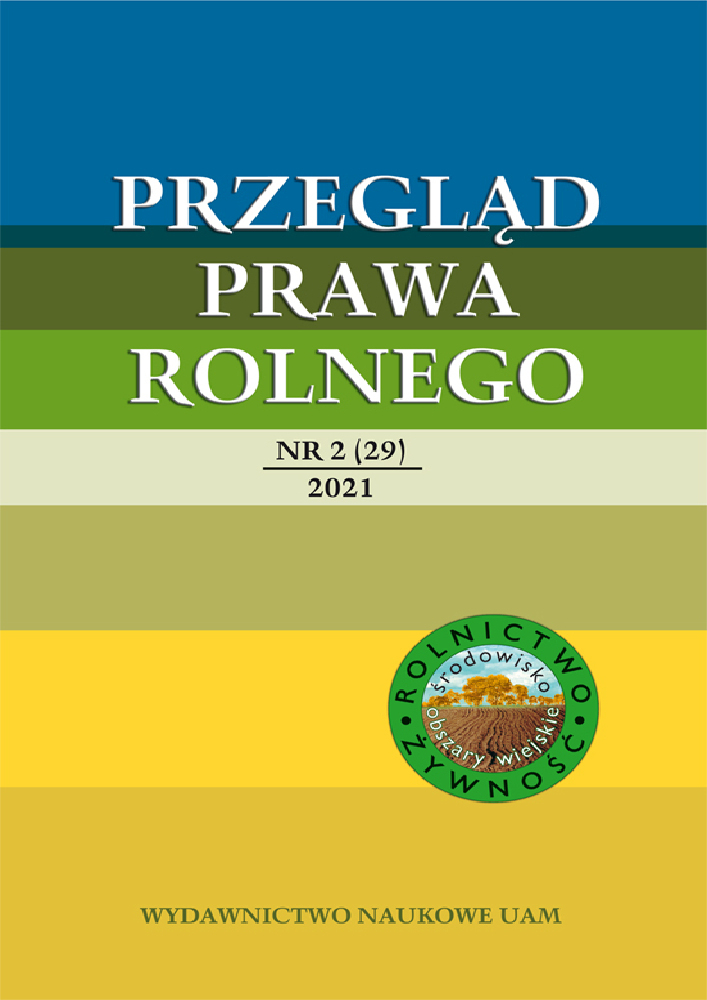Abstract
Sustainable development and problems related to it are currently the subject of interest of numerous scientific, governmental and social bodies, and the discussion that is going on concerns all levels and types of environmental pressures. Therefore, the activities undertaken by UNESCO that aim at creating a platform for sustainable interaction in the form of biosphere reserves should be considered as worthy of presentation here. They constitute an exceptional manifestation of the implementation of the sustainable development principle in practice.
References
Budzinowski R. (2002), Status prawny rolnika jako przedsiębiorcy (zagadnienia wybrane), „Ruch Prawniczy, Ekonomiczny i Socjologiczny” nr 3.
Budzinowski R. (2006), Przyrodniczo-techniczny czynnik rozwoju prawa rolnego, „Przegląd Prawa Rolnego” nr 1.
Budzinowski R. (2007), Międzynarodowy czynnik rozwoju prawa rolnego, „Przegląd Prawa Rolnego” nr 2.
Budzinowski R. (2014), Prawo rolne wobec współczesnych wyzwań, „Przegląd Prawa Rolnego” nr 2.
Caldwell L.K. (1996), International Environmental Policy, Duke University Press.
Dyer M.I., Holland M.M. (1988), UNESCO’s Man and the Biosphere Program, „BioScience” vol. 38(9).
Hadley M. (2006), A practical ecology: the man and the biosphere (MAB) programme, w: P. Petitjean, V. Zharov, G. Glaser, J. Richardson, B. de Padirac, G. Archibald (red.), Sixty Years of Science at UNESCO 1945–2005, Paris.
Ishwaran N. (2012), Science in intergovernmental environmental relations: 40 years of UNESCO’s Man and the Biosphere (MAB) Programme and its future, „Environmental Development” vol. 1(1).
Ishwaran N., Persic A., Tri N.H. (2008), Concept and practice: the case of UNESCO biosphere reserves, „International Journal of Environment and Sustainable Development” vol. 7(2).
Jeżyńska B. (2012), Proekologiczne instrumenty wsparcia zrównoważonego rozwoju obszarów wiejskich, „Studia Iuridica Agraria” t. X.
Jeżyńska B. (2014), Współczesne funkcje gospodarstw rodzinnych. Zagadnienia prawne, Opinie i Ekspertyzy OE – 214, Biuro Analiz i Dokumentacji Senatu.
Köck G., Arnberger A., Möller L. (2020), Agenda 2030 und Lima-Aktionsplan-Anpassung der Biosphere Reserves für die Zukunft, „Biosphäre 4.0”, Berlin – Heidelberg.
Kopnina H. (2020), Education for the future? Critical evaluation of education for sustainable development goals, „The Journal of Environmental Education” vol. 51(4).
Król M. A. (2013), Producent rolny jako podmiot korzystający ze środowiska, „Studia Iuridica Agraria” t. XI.
Lal R. (2013), Enhancing ecosystem services with no-till, „Renewable Agriculture and Food Systems” vol. 28(2).
López L., Rubio M.C., Rodríguez D. (2021), The role of scientists at the human-nature interface on MaB protected areas, „Cuadernos Geográficos” vol. 60(1).
Meggle A. (2016), Biosphere reserves, real-life observatories of climate change, draft UNESCO MAB report based on a 2015 survey, Paris 2017.
Niewiadomski A. (2015), Rodzinne gospodarstwo rolne wobec ochrony środowiska w prawie polskim i europejskim, w: P. Litwiniuk (red.), Prawne mechanizmy wspierania i ochrony rolnictwa rodzinnego w Polsce i innych państwach Unii Europejskiej, Warszawa.
Reed M.G. (2019), The contributions of UNESCO Man and Biosphere Programme and biosphere reserves to the practice of sustainability science, „Sustainability Science” vol. 14(3).
License
Copyright (c) 2021 Beata Jeżyńska, Radosław Pastuszko

This work is licensed under a Creative Commons Attribution-ShareAlike 4.0 International License.





